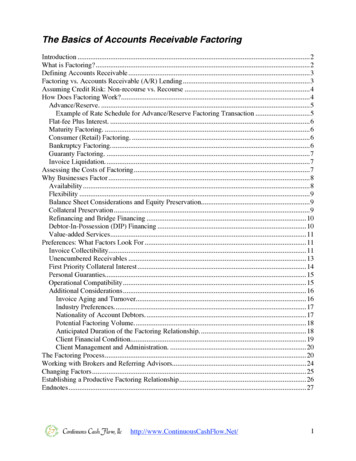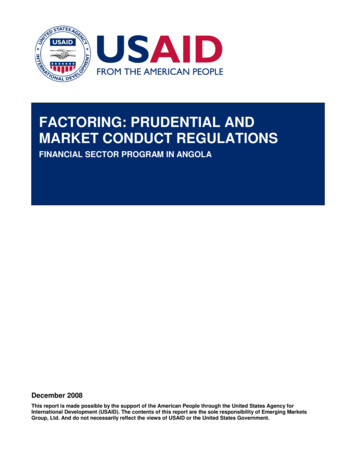
Transcription
Public Disclosure AuthorizedPublic Disclosure AuthorizedPublic Disclosure AuthorizedPublic Disclosure Authorized37512feasibility studyFOR ESTABLISHMENT OFFACTORINGCOMPANYIN SERBIA
Feasibility Study - FactoringSEEDSoutheast Europe Enterprise DevelopmentALBANIA BOSNIA AND HERZEGOVINA FYR MACEDONIA SERBIA AND MONTENEGROHEADQUARTERSHamdije Kreševljakovica 19/IV71000 Sarajevo, Bosnia and HerzegovinaTel.:( 387 33) 251-555; Fax: ( 387-33) 217-762www.ifc.org/seedAcknowledgements:While developing this study with its consultants’ team, SEED has interviewed a number oforganizations and institutions that have provided important input data necessary for thefactoring business modelling and analysis of different options of legal status of the FactoringCompany. We have interviewed and had very useful discussions with numerous commercialbanks representatives, representatives of the National Bank of Serbia, Association of SerbianBanks and Ministry of International Economic Relations Serbia.SEED is grateful for the time, inputs and cooperativeness that these organizations andinstitutions and their representatives have provided during the research phase of thedevelopment of this Study.Special thanks goes to our team of consultants; Mr. Dragan Vukovic and hissubstantive knowledge and contribution to our better understanding of banking andmarket potential issues facing factoring business in the country, and for adding valueto overall Study, assuming the role of consulting editor; Mr. Milan Parivodic whoseexpertise and experience in the area of business law provided in-depth analyses ofSerbia legal framework and recommendations with respect to having factoringbusiness in place;, and to Mr. Predrag Milosavljevic, whose input on taxation andaccounting standards that influence the establishment and operations of potentialfactoring companies in Serbia was invaluable.2
Feasibility Study - FactoringTABLE OF CONTENTS1EXECUTIVE SUMMARY .71.11.21.32The Environment for Factoring in Serbia . 7Legal Issues. 8Accounting and Tax Issues . 10ECONOMIC ENVIRONMENT .112.1Introduction. 112.2The Financial Market Environment – Rehabilitation and the Strategy ofrestructuring Banking Sector in Serbia . 122.3The Environment for Factoring in Servia . 182.4Special focus on SMEs – The Market for the factors . 232.5Conclusions and Recommendation. 253LEGAL ISSUES .273.13.23.33.43.54ACCOUNTING AND TAX ISSUES.374.14.24.35Introduction. 27General Contract Law Framework. 27Factoring contract Law Framework de lege lata. 28The legal status of potential factors . 34Recommendations. 36Accounting Issues . 37Tax Issues. 39Analyses and recommendations. 46STRATEGY AND BUSINESS POLICY.485.15.25.35.4The Mission . 48Pricing policy . 50Risk policy . 50Analyses and Recommendations . 526 UNIDROIT CONVENTION ON INTERNATIONAL FACTORING(OTTAWA, 28 MAY 1988) .537APPENDICES.577.1LOR:«ASSIGNMENT OF CLAIMS BY CONTRACT (ASSIGNMENT ORCESSION) . 577.2LOR: III. REPUDIATION OF A CONTRACT DUE TO NON-PERFORMANCE593
Feasibility Study - FactoringSEEDSoutheast Europe Enterprise DevelopmentALBANIA BOSNIA AND HERZEGOVINA FYR MACEDONIA SERBIA AND MONTENEGROHEADQUARTERSHamdije Kreševljakovica 19/IV71000 Sarajevo, Bosnia and HerzegovinaTel.:( 387 33) 251-555; Fax: ( 387-33) 217-762www.ifc.org/seedTerms of ReferenceFeasibility Study: Establishing of a Factoring Company in SerbiaA.ScopeThe Project involves a comprehensive review of the environment for establishingfactoring companies in Serbia. Besides working on a study on possibilities forestablishing of factoring companies in Serbia, the consultant will look at thepossibility to establish a single company that would serve demands of Serbia andBosnia and Herzegovina. Consultants on the project will research, analyze, and drawconclusions and recommendations related to the legal environment amongst others. Inparticular, the SME sector will be investigated since the majority of factoringopportunities lies here and not in the moribund state-owned / socially owned sector.SEED will support consultants with on-the-ground legal advisers and throughintroduction to leading SMEs in the economy. The scope will include but not limitedto the following:1) General information about Serbia, esp. at it would relate to Factoring (not to exceed 1/3 ofthe report)a) Summary of the legal environmentb) Summary of the taxation environmentc) Summary of the banking environmentd) Overview of Serbia banking systemsi) Are there banks specifically strong in financing exports?ii) Serbia Banking Acts (incl. capital requirements, licensing process, F/Xregulations, other important regulations and requirements)e) Other relevant observations about Serbia as a business environment** IFC has made a large investment into the banking sector in Serbia. IBRD hasconcluded negotiations with Serbia government on a new credit to improve the businessenvironment. Further respective information may be insufficient to be included here.2) The Environment for Factoring in Serbiaa) Generali) Basic considerations regarding Factoring within Serbia financing system (incl.whether Factoring is considered as banking product, and implications)b) The Marketi) Is there a potential market for export factoring in Serbia?(1) Exports of consumer goods, with special focus on SME exporters (countriesof destination, volume of these exports, current status of refinancing exports,export promotion by guarantees, profile of exporting companies, etc.)(2) How are exports being financed now (banks, L/C's, subsidised lending forexports etc)?4
Feasibility Study - Factoring(3) How are exports guaranteed now (Insurance companies, "IMPEX”organisation etc)?ii) Is there a potential market for domestic factoring in Serbia?(1) How SMEs finance their receivables right now (prepayments by buyers, banklending, other)?(2) Can factoring supplant expensive and hard to obtain revolving credits, whichcurrently finance the bulk of SME working capital?(3) Are there mechanisms to secure payments (insurance, bank guarantee, bill ofexchange)?iii) The buyers’ market:(1) What is the structure of buyers for the potential products (consumer good):international chains v. "mama papa" shop?(2) What are the payment terms in consumer goods in the different buyer groups?(a) How are invoices being collected?(iv)Marketing(1) What is the likelihood for Serbia market to accept the “Factoring” product?(2) How to promote the Factoring product?(v)Describe the development of Factoring markets in comparative countries inthefirst 3 years, and compare to the outlook for Serbia.c) Legal Issuesi)What legal requirements are necessary in order to have Factoring in place?Compare to the situation in Serbiaii)Legal status of factoring companies (bank versus trading company)iii)Impact of the legal status (different capital requirements, license, managementrequirements, FX regulations within the financial services industry, etc.)iv)Is there a legal framework that makes the product “Factoring” possible?v)Is there a legal framework which influences the product “Factoring” (e.g. FXregulations)vi)Describe the FX-regulations influencing the Factoring business (keepingaccounts in FX, refinancing in FX, etc.)vii) How can receivables be assigned?viii) Is there any prohibition of assignment of receivables?ix)How can receivables be collected (general rules, legal procedures, etc.)?x)Other relevant legal issuesd)Tax Issuesi)Is there a tax framework that influences Factoring?ii) What is the tax treatment of Factoring in Serbia? How does thiscompare to best practices?iii) Describe and analyse any transaction-based and/or other feesiv) Other relevant tax issuese)Accounting Issuesi)What accounting regulations are applicable for Factoring? Compare to IASii)What is the accounting treatment for the factor? Compare to IASiii) What is the accounting treatment for the customer? Compare to IASiv) Other relevant accounting issues.5
Feasibility Study - Factoringf) Other IssuesOther relevant issues related to the environment for Factoring in Serbia3) Summary, Comparison, Analysis and Recommendationsa)b)B.Summary of the current situation (legal, tax, accounting, market) in Serbia versusthe situation in countries with a developed factoring market. Outline variancesfrom best practices and provide related recommendation.Recommendations provided will be structured as follows:(1) immediate importance(2) near-term importance(3) long-term importanceWhat is necessary to be done in order to create Factoring as a financingopportunity within Serbia?Deliverables:1) Periodic written and verbal updates during the whole process (via e-mail, facsimileor phone);2) Summary of recommendations of necessary legal changes;3) An analysis of the financial sector, legal and regulatory environment, and potentialmarket of the factoring product in Serbia and Serbian that identifies key obstaclesto the establishment of a factoring company;4) A financial forecast for a Serbia and Serbian factoring company;5) A business plan for a Serbia and Serbian factoring company;6) A written report containing the information outlined in this proposal (in Englishlanguage); draft report to be provided to SEED and IFC for comment;7) Summary Report for the Serbian and Serbia Governments, satisfactory to SEEDand IFC, outlining the study’s findings, listing needed changes to the regulatoryenvironment (indicating the bases of the recommended changes)8) One-day workshop in Belgrade for stakeholders, including preparationof materials.D.Reporting:International consultant and local consultants on the team were reporting to Mr.Davorin Pavelic, Senior Analyst and Ms. Azra Delalic, Program Asst. of PrivateSector Development Team (PSD), but they worked with all team staff as appropriatein order to accomplish above-listed tasks.6
Feasibility Study - Factoring1 EXECUTIVE SUMMARYThe purpose of this Study prepared by the SEED is to express the views on the issue ofprospects for the development of factoring in Serbia and establishment of a FactoringCompany in Serbia.The Study has three main areas in focus. The first is to present the economic environment inSerbia and need for alternative financial support to the real economy sector. The secondobjective is to focus attention on the legal issues relevant for the development of the factoringcommercial and financial activities as well as the organizational and regulatory aspects of thenew entrants in the financial and commercial markets providing such activities. The thirdobjective is focusing on the accounting and tax issues.All of the three parts of the Study are pointing out the good prospects for the development offactoring in Serbia provided some of the impediments inherent in the existing legal andregulatory fabric are removed and the factoring concept is properly regulated. Such anopinion calls for immediate and across the table approach in addressing the relevant issues, soas to arm the national economy with yet another mighty financial tool for achieving thenecessary high level of exports and economic growth after years of decline and stagnation.To that end each of the three parts contains recommendations in respect of the major issuescovered addressed to the interested parties.1.1 The Environment for Factoring in SerbiaBanking sector being the backbone of the financial sector has been receiving special attentionby the reform approach of the government as the Rehabilitation and Reconstructing of thebanking sector is ranking among three top priorities of the basic economic aims, together withFiscal Reform and Privatisation.After the major political change in October 2000 the Rehabilitation and Restructuring of thebanking sector in Serbia has had four stages. The current stage is the fourth stage and itindicates that the banking system in Serbia is still in the making as 19 banks should berecapitalized by, most certainly, foreign strategic partners, with other banks outside of thegroup also looking for strategic partners from abroad or for mergers and acquisitions in orderto surmount the problem of maintaining the minimum capital requirements.With such a predicament the banks in Serbia are yet to develop proper market activities andthe financial market will only in a foreseeable future benefit from wider range of bankingproducts and sophisticated services.On the other hand SMEs, the long recognized sector of real economy harbouring the outlooksfor overall economic growth still does not receive adequate attention in the statisticalcoverage. The track record of various sectors of industry are not broken down to reveal theSMEs performance.The foreign lenders are extending their support by way of international credit lines availableto the SMEs sector through the local banks chosen to be on-lenders or administrators andguarantors. However the SMEs face constant lack of working capital.Strong need of companies in Serbia specially SMEs, for alternative financial support, isbased:? on the twelve years old chronic problem of insufficient working capital and? on an inadequate bank credit support.The above situation indicates the prospects for the factoring market in Serbia together withother opportunities that have already been materialized in the light of monetary stability andadequate initial legal framework.7
Feasibility Study - FactoringForeign factoring companies are necessary on the Serbian market. So, it is highlyrecommended to form a joint venture between an interested local bank and an experiencedEuropean factoring company. A participation of IFC in the share capital should be welcomed.Campaign should be started to get the support from the authorities, 1 to regulate the factoringbusiness, specially in defining factoring companies as "financial institutions". The marketparticipants have to be regulated and supervised, so that the proper prudential and otherrequirements securing the health of the markets can be in place, i.e. minimal capitalrequirements they will have to maintain and the business standards they must observe.Preference of establishing factoring companies does not exclude bank operating a factoringin-house unit. The parallel presence of these two options is necessary and possible, not onlybecause of the volume of demand for factoring service but also because of possibility forcomplementary operations.1.2 Legal IssuesFactoring as a commercial service is based on factoring contracts. The UNIDROITConvention on International Factoring (Ottawa, 28 May 1988) regulates the particularities offactoring relationship. The Convention on International Factoring should be ratified by Serbiaand Montenegro, as its prime business partners have ratified it as well.Factoring contract is not regulated as a nominated contract in the Serbian and Montenegrinlegal system. The only piece of legislation in Serbia and Montenegro which only mentions theterm «factoring» is the Law on Prevention of Money Laundering.Law Obligational Relations (LOR) provides a solid contractual framework for assignment ofreceivables which is essential to factoring. Provisions of LOR on assignment of receivablesdo regulate general assignment of receivables well. A master factoring agreement can bestipulated. LOR provisions however do not regulate particularities of the factoringrelationship needed by factoring business. The factoring contract can regulate particularitiesof the factoring relationship.Business community, courts, tax authorities and other administrative bodies are not familiarwith the factoring relationship and need guidance.A law on factoring would be more authoritative than factoring contracts before courts andadministrative bodies, and it would unify their approach to factoring from the outset. This lawshould inter alia regulate the relationship aspects based on the approach taken by theConvention on International Factoring. Beginners mistakes would thereby be avoided in theinterpretation of contracts and the transaction in general by courts, Foreign CurrencyInspection, National Bank and tax authorities. For this same reason leasing is regulated in aspecial Law on Leasing although leasing could have been operated based on leasing contractsonly. It would be easier to introduce factoring business into Serbia if a law on factoring werein place, although factoring operations could be started on solid legal grounds beforeenactment of such law.It is essential for factoring business, in case of debtor default, to have an efficient system ofcourt ordered collection of receivables. Our courts act on basis of the Law on ExecutionProcedure (2000) which does not provide for an efficient collection procedure and needs to berevised to make it more impactful for the creditor.Normally, the creditor has to obtain a final judgment in civil trial procedure, and then basedon it, to pursue the execution procedure until collection is effected.To overcome this slow procedure an inefficient summary execution procedure is regulated inthe Law on Execution procedure. The great drawback of this procedure is that if the1 Ministry of Finance, Ministry of International Economic Relations, National Bank of Serbia8
Feasibility Study - Factoringdefaulting debtor raises an exception against the plaintiffs “veritable document”, challengingits debt on any grounds - even without producing any evidence for its assertions - the courtwill automatically refer the matter to be resolved in an civil trial procedure, which brings us tothe regular slow collection process.It is obvious that the Law on Execution Procedure needs amendment to make it more effectivefor the credito
Public Disclosure Authorized Public Disclosure Authorized Public Disclosure Authorized Public Disclosure Authorized. Feasibility Study - Factoring 2 SEED Southeast Europe Enterprise Development . establishing of factoring companies in Serbia, the consultant will look at the possibility to e











